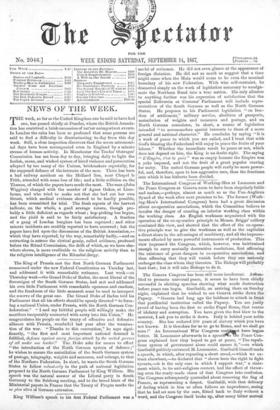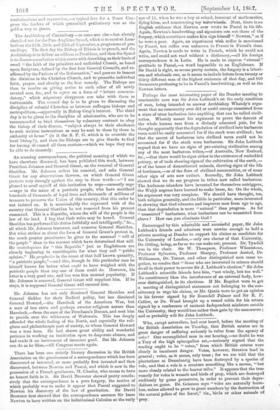The Geneva Congress has been still more incoherent. AsSem- bled
to promote universal peace, it seems to have been chiefly successful in eliciting speeches showing what needs destruction before peace can begin. Garibaldi, on arriving there on Sunday night, explained that he wished to see Geneva strike down the Papacy. " Geneva had long ago the boldness to attack in front that pestilential institution called the Papacy. You are justly proud of having been the first to strike Papal Rome, that centre of idolatry and corruption. You have given the first blow to the monster, I ask you to strike it down. Italy is behind your noble country. She has endured 300 years of slavery which you have not known. It is therefore for us to go to Rome, and we shall go soon !" An International War Congresst have begun better. M. Lemonnier afterwards in a spee:llite Peace Con- gress explained how they hoped to get at peace, " The repub- lican system of government alone could ensure it,"—on which Garibaldi publiclyembraced M. Lemonnier. Garibaldi himself made a speech, in which, after repeating a short creed,—which we ex- tract elsewhere,—he declared that " slaves have the right to fight tyrants,—it is the only case in which I support war," a state- ment which, in its anti-religious context, had the effect of throw- ing even the ready-made chaos of that Congress into confusion. The Congress subsequently quarrelled about removing the flag of France, as representing a despot. Garibaldi, with that delicacy of feeling which in him so often follows an imprudence, seeing that he had set men by the ears, flitted back to Italy without a word, and the Congress itself broke up, after many bitter mutual
recriminations and reproaches, —a typical fate for a Peace Con- gress the leaders of which prescribed preliminary war as the golden way to peace.































